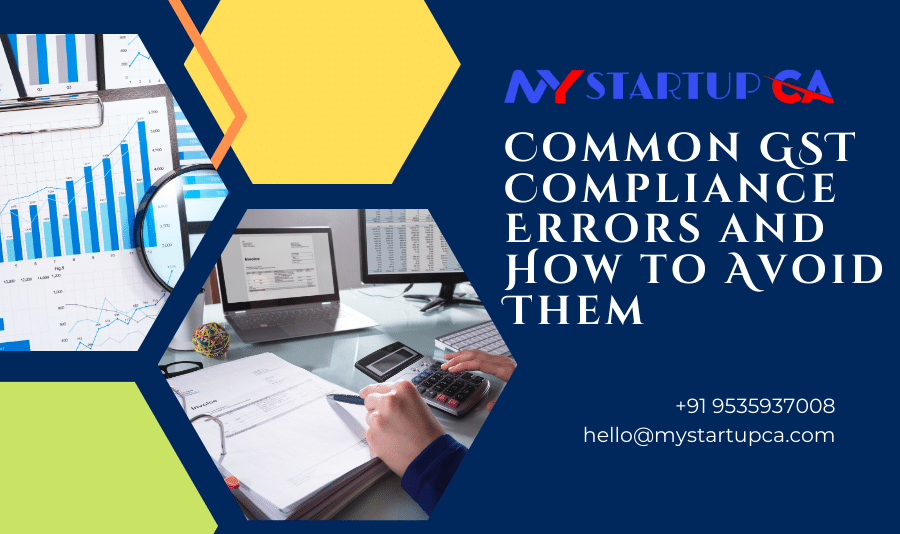
Discover how to steer clear of common GST compliance pitfalls with our comprehensive guide. Learn strategies to avoid errors such as incorrect invoicing, delayed filing of returns, mismatches in GSTR-1 and GSTR-3B, non-compliance with e-way bill requirements, inadequate record-keeping, and lack of knowledge. Ensure smooth operations and mitigate compliance risks effectively.
MyStartupCA
Goods and Services Tax (GST) compliance is crucial for businesses to avoid penalties, fines, and legal complications. However, navigating the complexities of GST regulations can be challenging, leading to common compliance errors. In this guide, we'll highlight some of the most frequent GST compliance errors businesses make and provide actionable strategies to avoid them.
1. Incorrect Invoicing
One of the most common GST compliance errors is incorrect invoicing. This includes errors such as:
- Missing or incorrect GSTIN (Goods and Services Tax Identification Number) on invoices
- Incorrect tax rates or amounts
- Incomplete or inaccurate details of the supplier or recipient
To avoid incorrect invoicing errors, businesses should implement robust invoicing processes and ensure that all invoices comply with GST regulations. Regular training of staff involved in invoicing processes can also help prevent errors.
2. Delayed Filing of GST Returns
Filing GST returns on time is essential to avoid penalties and interest. However, many businesses fail to file their returns within the specified due dates, leading to compliance issues. To avoid delayed filing of GST returns, businesses should:
- Maintain a calendar of GST return due dates and set reminders for filing
- Regularly reconcile input tax credit (ITC) and prepare necessary documents in advance
- Consider using GST compliance software to automate return filing processes and ensure timely submission
3. Mismatch in GSTR-1 and GSTR-3B
GSTR-1 is the monthly or quarterly return that businesses file to report outward supplies, while GSTR-3B is the monthly return for reporting summary details of inward and outward supplies along with the payment of taxes. Mismatches between GSTR-1 and GSTR-3B can lead to compliance issues and reconciliation problems. To avoid mismatches:
- Ensure that data entered in GSTR-1 matches with the details reported in GSTR-3B
- Conduct regular reconciliations and identify discrepancies early for timely rectification
4. Non-compliance with E-way Bill Requirements
Businesses engaged in the movement of goods worth more than specified thresholds are required to generate e-way bills for interstate and intrastate transactions. Non-compliance with e-way bill requirements can result in penalties and detention of goods. To ensure compliance:
- Understand e-way bill requirements based on the nature and value of goods being transported
- Implement robust systems to generate e-way bills accurately and promptly for all applicable transactions
5. Inadequate Record-keeping
Maintaining proper records and documentation is essential for GST compliance. However, many businesses overlook this aspect, leading to non-compliance issues during audits. To avoid inadequate record-keeping:
- Maintain detailed records of all transactions, including invoices, bills of supply, delivery challans, and payment receipts
- Organize records systematically and store them securely for easy retrieval during audits
- Conduct periodic reviews of record-keeping practices and implement improvements as necessary
6. Lack of Knowledge and Training
A lack of understanding of GST regulations among employees can lead to compliance errors. Businesses should invest in educating and training their staff on GST compliance requirements. Regular training sessions, workshops, and updates on changes in GST laws can help employees stay informed and compliant.
Avoiding common GST compliance errors is essential for businesses to maintain compliance, avoid penalties, and ensure smooth operations. By addressing issues such as incorrect invoicing, delayed filing of returns, mismatches in GSTR-1 and GSTR-3B, non-compliance with e-way bill requirements, inadequate record-keeping, and lack of knowledge and training, businesses can enhance their GST compliance efforts and mitigate compliance risks effectively. Prioritizing GST compliance and implementing proactive measures will not only safeguard businesses against legal and financial repercussions but also foster trust and credibility among stakeholders.

